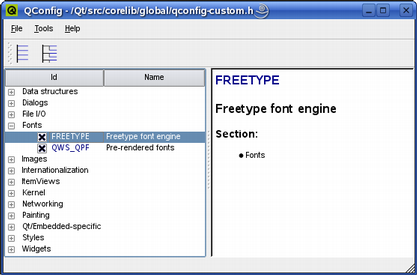Qt for Embedded Linux FontsQt for Embedded Linux uses the FreeType 2 font engine to produce font output. The formats supported depends on the locally installed version of the FreeType library. In addition, Qt for Embedded Linux supports the Qt Prerendered Font formats (QPF and QPF2): light-weight non-scalable font formats specific to Qt for Embedded Linux. QPF2 is the native format of Qt for Embedded Linux. QPF is the legacy format used by Qt/Embedded 2.x and 3.x. Several of the formats may be rendered using anti-aliasing for improved readability. When Qt for Embedded Linux applications run, they look for fonts in Qt's lib/fonts/ directory. Qt for Embedded Linux will automatically detect prerendered fonts and TrueType fonts. For compatibility, it will also read the legacy lib/fonts/fontdir file. Support for other font formats can be added. To make a suggestion, please create a task in our bug tracker at http://bugreports.qt.nokia.com.
All supported fonts use the Unicode character encoding. Most fonts available today do, but they usually don't contain all the Unicode characters. A complete 16-point Unicode font uses over 1 MB of memory. FreeType FormatsThe FreeType 2 library (and therefore Qt for Embedded Linux) can support the following font formats:
It is possible to add modules to the FreeType 2 font engine to support other types of font files. For more information, see the font engine's own website: http://freetype.sourceforge.net/freetype2/index.html. Glyphs rendered using FreeType are shared efficiently between applications, reducing memory requirements and speeding up text rendering. Qt Prerendered Font (QPF2)The Qt Prerendered Font (QPF2) is an architecture-independent, light-weight and non-scalable font format specific to Qt for Embedded Linux. Nokia provides the cross-platform makeqpf tool, included in the tools directory of both Qt and Qt for Embedded Linux, which allows generation of QPF2 files from system fonts. QPF2 supports anti-aliasing and complex writing systems, using information from the corresponding TrueType font, if present on the system. The format is designed to be mapped directly to memory. The same format is used to share glyphs from non-prerendered fonts between applications. Legacy Qt Prerendered Font (QPF)Nokia provides support for the legacy QPF format for compatibility reasons. QPF is based on the internal font engine data structure of Qt/Embedded versions 2 and 3. Note that the file name describes the font, for example helvetica_120_50.qpf is 12 point Helvetica while helvetica_120_50i.qpf is 12 point Helvetica italic. The Legacy fontdir FileFor compatibility reasons Qt for Embedded Linux supports the fontdir file, if present. The file defines additional fonts available to the application, and has the following format: name file renderer italic weight size flags
|




















